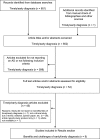Timely Diagnosis for Alzheimer's Disease: A Literature Review on Benefits and Challenges
- PMID: 26484931
- PMCID: PMC4927869
- DOI: 10.3233/JAD-150692
Timely Diagnosis for Alzheimer's Disease: A Literature Review on Benefits and Challenges
Abstract
Background: Timely diagnosis of Alzheimer's disease (AD) refers to a diagnosis at the stage when patients come to the attention of clinicians because of concerns about changes in cognition, behavior, or functioning and can be still free of dementia and functionally independent.
Objectives: To comprehensively review existing scientific evidence on the benefits and potential challenges of making a timely diagnosis of AD.
Methods: Relevant studies were identified by searching electronic databases (Medline, Embase) and bibliographies for studies published in English between 1 January 2000 and 2 June 2014 on the consequences of a timely diagnosis of AD.
Results: Nine studies were identified that investigated the consequences of diagnosing AD at the initial stages; none were specifically focused on prodromal AD. A timely diagnosis potentially offers the opportunities of early intervention, implementation of coordinated care plans, better management of symptoms, patient safety, cost savings, and postponement of institutionalization. Barriers to making a timely diagnosis include stigma, suicide risk, lack of training, diagnostic uncertainty, shortage of specialized diagnostic services, and the reluctance of healthcare providers to make a diagnosis when no effective disease-modifying options are available.
Conclusions: Despite its potential benefits, few published studies have explored the advantages or risks of a timely diagnosis of AD. In light of the cultural shift toward diagnosis at the initial stage of the disease continuum, when the patient does not yet have dementia, more investigations are needed to evaluate the benefits and address the barriers that may impede making a timely AD diagnosis.
Keywords: Alzheimer’s disease; diagnosis; pre-dementia; review; timely.
Figures
References
-
- McKhann G, Drachman D, Folstein M, Katzman R, Price D, Stadlan EM. Clinical diagnosis of Alzheimer’s disease: Report of the NINCDS-ADRDA Work Group under the auspices of department of health and human services task force on Alzheimer’s disease. Neurology. 1984;34:939–944. - PubMed
-
- Prince M, Bryce R, Ferri C (2011) World Alzheimer Report 2011: The benefits of early diagnosis and intervention. Alzheimer Disease International, http://www.alz.co.uk/research/WorldAlzheimerReport2011.pdf, Accessed on January 20, 2014
-
- Dubois B, Feldman HH, Jacova C, Cummings JL, Dekosky ST, Barberger-Gateau P, Delacourte A, Frisoni G, Fox NC, Galasko D, Gauthier S, Hampel H, Jicha GA, Meguro K, O’Brien J, Pasquier F, Robert P, Rossor M, Salloway S, Sarazin M, de Souza LC, Stern Y, Visser PJ, Scheltens P. Revising the definition of Alzheimer’s disease: A new lexicon. Lancet Neurol. 2010;9:1118–1127. - PubMed
Publication types
MeSH terms
LinkOut - more resources
Full Text Sources
Other Literature Sources
Medical



